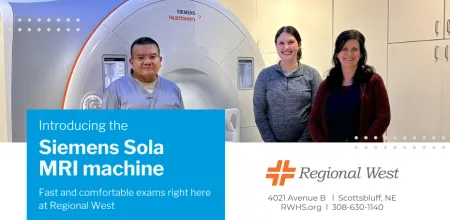Regional West Launches The Most Advanced Digital Mammography

Scottsbluff, NE – With the recent installation of the latest digital mammography technology, Regional West Breast Health Center greatly enhanced its ability to screen women for breast cancers.
“The new technology puts Regional West on the cutting edge of the latest in breast cancer screening technology, allowing us to more easily diagnose and treat breast cancer in its earliest stages,” said Sharon McKinney, Regional West Imaging Services Director.
"We are extremely proud to bring digital mammography to western Nebraska," said McKinney. "Chadron Community Hospital and Box Butte General Hospital will soon be moving to this new technology as well. Digital mammography improves image contrast, reduces use of radiation, decreases exam times and enhances image storage and transmission capabilities, all of which will be benefit women of the Panhandle."
With film mammography, which has been used for 35 years, images are recorded on film using an x-ray cassette. The film is viewed by the radiologist using a "light box" and then stored as a hard copy.
With digital mammography, the breast image is captured using an electronic x-ray detector, which converts the image into a digital image for review on a computer monitor – much like how a digital camera works. The digital mammogram is then saved on the computer, making it much easier to store and transmit.
While film mammography is very good, it is less sensitive for women who have very dense breasts, a common characteristic in younger women. The lack of image sensitivity can make cancer detection much more difficult.
Digital mammography creates digital images that can be greatly enhanced by electronically changing the brightness, size or contrast, making the radiographer’s job of reading the image much easier.
“In addition to better assisting radiologists, digital technology provides our patients with many notable benefits,” said McKinney. “We know that digital mammography uses less radiation (about 50 percent less) than standard film mammography. While the amount of radiation in film mammography is not dangerous, it is always best to use less radiation if possible.”
Another benefit, said McKinney, is that digital mammography is faster, which results in patients at the Breast Health Center having to spend less time in uncomfortable positions.” The images that are taken during the exam are available immediately.
“Regardless of the technology available to them, every woman should have regular mammograms after the age of 40,” said McKinney.
Regional West Health Services, with over 1,800 employees, provides comprehensive and innovative health care services for the people and communities of western Nebraska and the neighboring states of Colorado, South Dakota and Wyoming. With over 110 active physicians, 95 percent of whom are board certified or board eligible, plus an additional 25 consulting specialists, we offer care that spans more than 30 medical specialties. Regional West Medical Center, a subsidiary of Regional West Health Services, is accredited by The Joint Commission and is one of three Level II Trauma Centers in the state of Nebraska.








